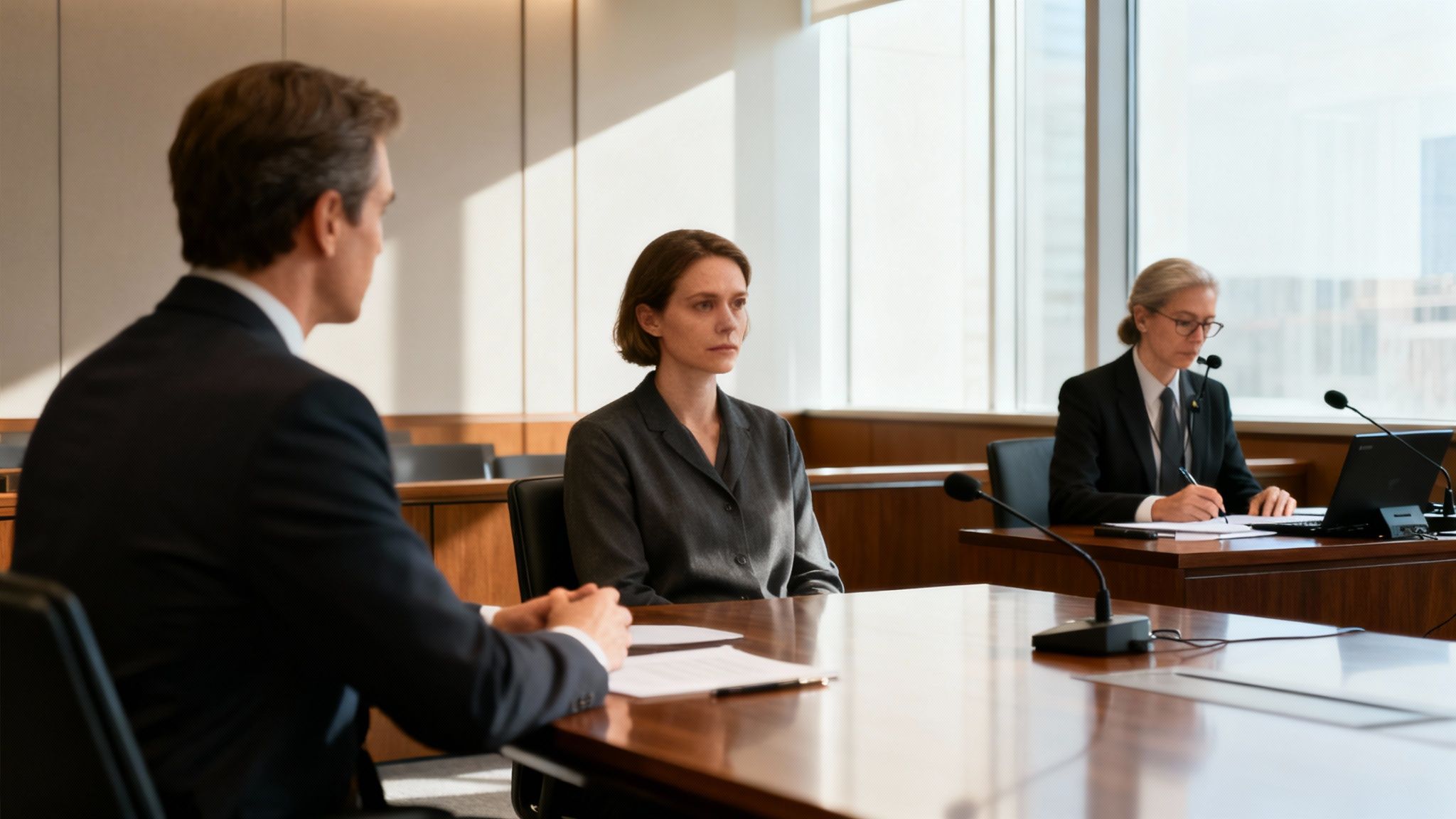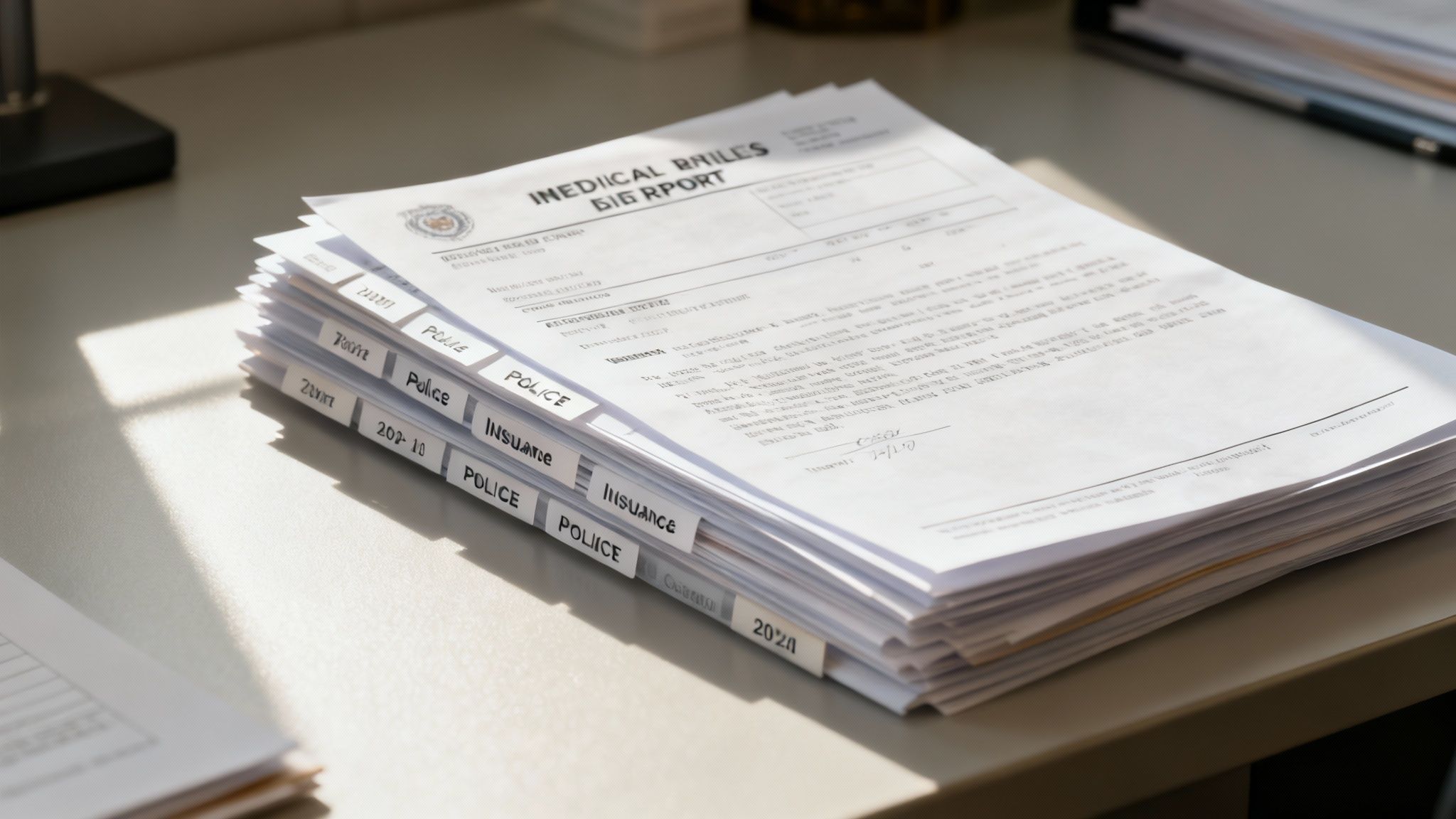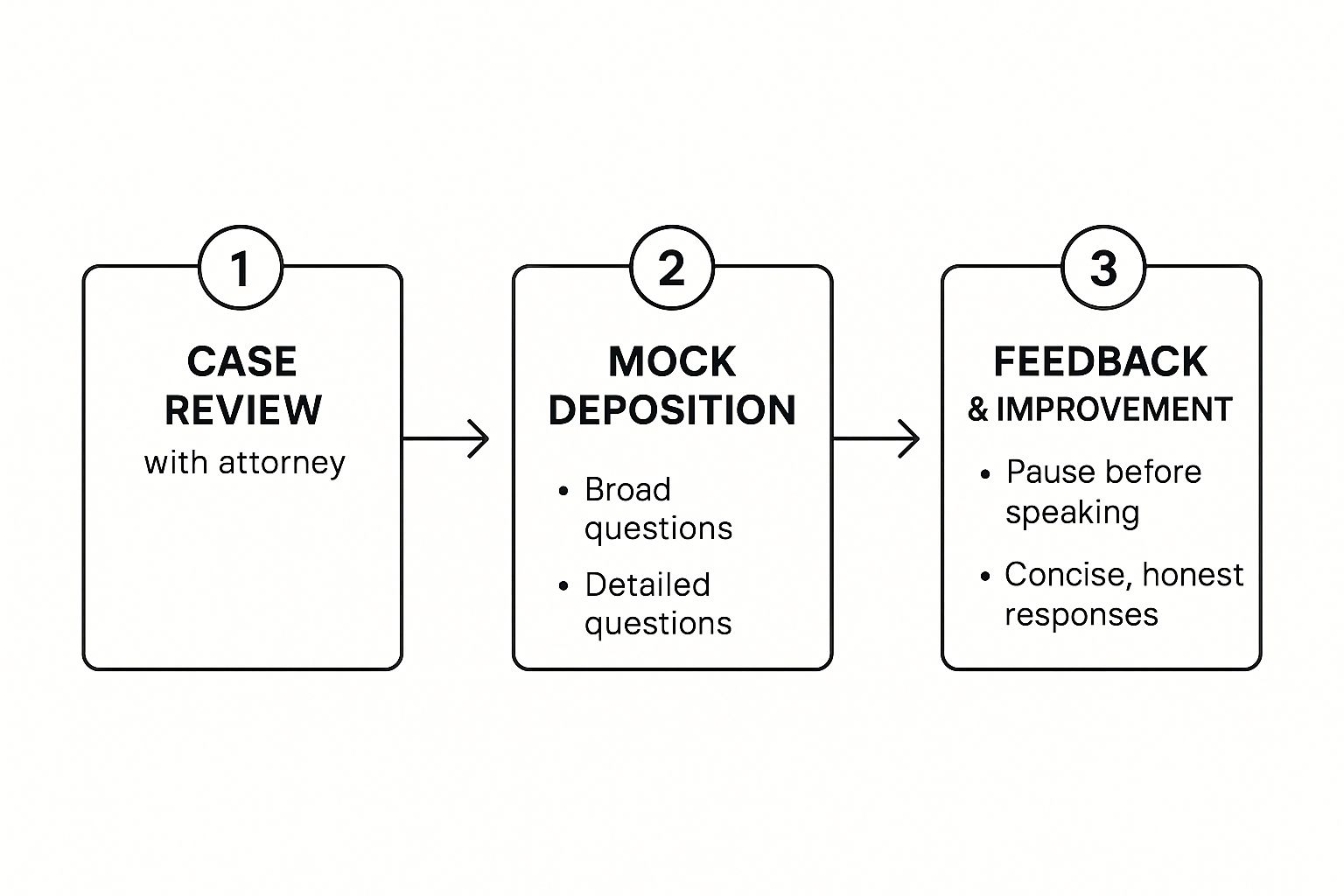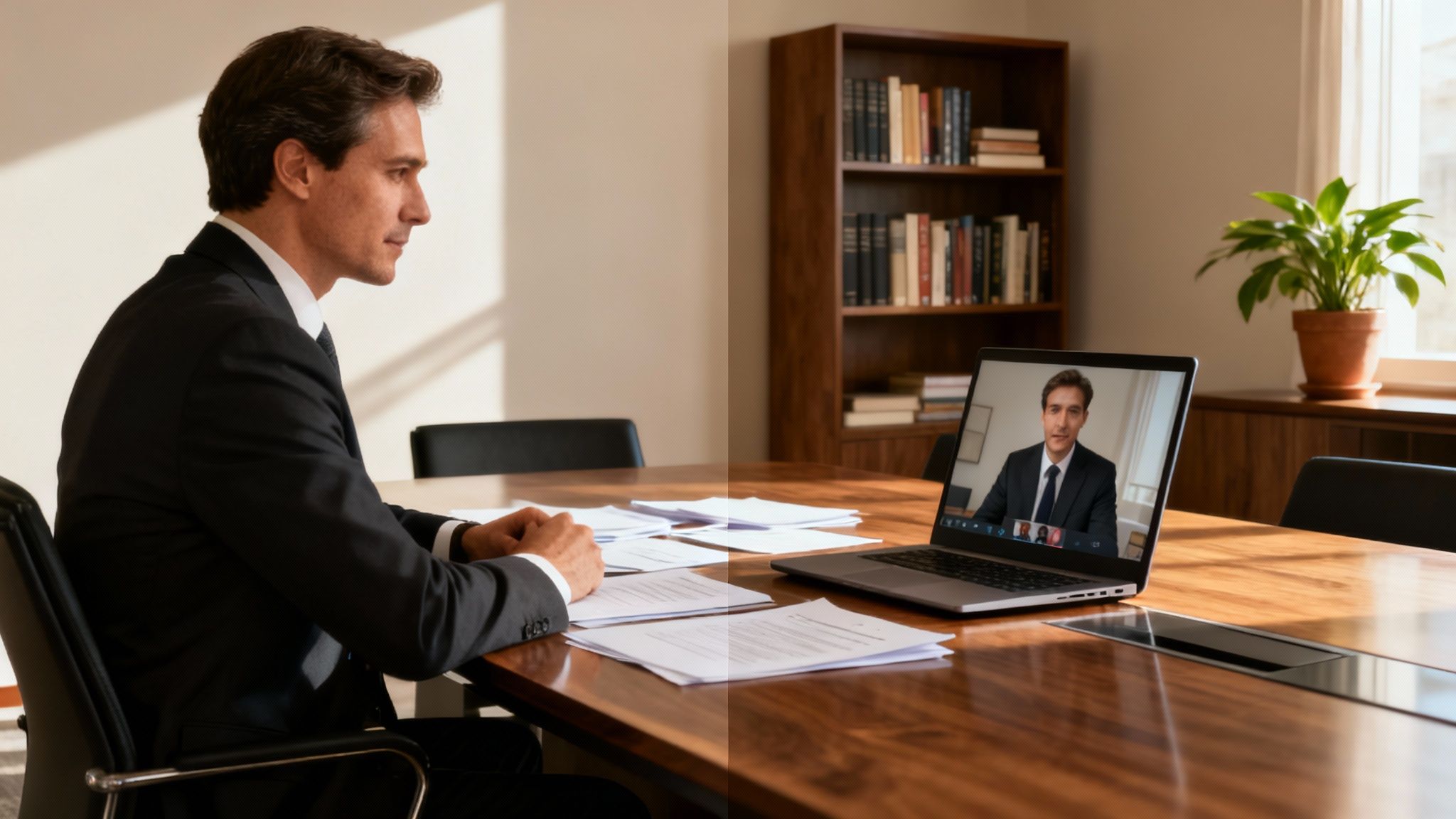Preparing for a Deposition in Oregon A Guide
"I was satisfied once John Bell took over my case."
"Communication was always timely."
Preparing for a Deposition in Oregon A Guide
When you're getting ready for a personal injury deposition, it’s about more than just remembering facts. It's a mix of reviewing your case documents with your lawyer, practicing how you'll answer questions, and getting a handle on the formal etiquette of the process. This isn't an interrogation; it's a structured conversation designed to get to the truth, and solid preparation is your most powerful tool.
What a Deposition Is and Why It Matters

A deposition can feel like a high-stakes moment, and in many ways, it is. It's a formal, out-of-court Q&A session where you give testimony under oath. For many of my clients in Oregon, this is the first—and often the only—time the opposing attorney will hear the story of your injury directly from you.
The main reason for a deposition is something lawyers call discovery. The other side wants to find out what you know about the incident, get the details on your injuries, and understand how those injuries have changed your day-to-day life. Your testimony gives them a clearer picture of your case's strengths and weaknesses, which is a massive factor in any settlement talks. A calm, consistent, and believable performance can genuinely boost the value of your claim.
Who Will Be in the Room
Knowing who you'll see in the conference room can take a lot of the mystery out of the day. It's not a crowded courtroom, but a few key people will be there, each playing a specific part.
- Your Attorney: Their main job is to protect you. We'll prepare you beforehand, object to improper questions during the deposition, and make sure everything stays on the level.
- The Opposing Attorney: This is the lawyer for the person or company you're suing (or their insurance company). They will be asking you the questions.
- The Court Reporter: This is a neutral professional who creates the official, word-for-word transcript of everything said. They're also the person who will have you swear an oath to tell the truth at the start.
- A Videographer (Sometimes): It's becoming more common for depositions to be videotaped. This captures not just your words but also your demeanor and body language, which can be just as important.
Here's a quick cheat sheet to keep the players straight.
Deposition Preparation At a Glance
| Your Attorney | Your advocate and protector. | Trust their guidance; listen for their objections. |
| Opposing Attorney | Gathers facts for the other side. | Answer their questions simply and truthfully; don't volunteer extra info. |
| Court Reporter | Creates the official written record. | Speak clearly and wait for questions to finish before answering. |
| Videographer | Records a visual record of the testimony. | Be mindful of your posture and expressions; remain calm. |
Understanding these roles helps you focus on what matters most: clearly and honestly answering the questions asked of you.
Your Testimony Sets the Foundation
That transcript the court reporter types up? It becomes a critical piece of evidence. Every single word is on the record and can be brought up again later, especially if your case goes to trial. If your story changes or you contradict what you said in the deposition, you can bet the opposing lawyer will use it to attack your credibility.
Your deposition isn't just a legal hoop to jump through; it's where the foundation of your case narrative is poured. A consistent, truthful account locks in your story and keeps the other side from twisting the facts down the road.
This is exactly why we spend so much time preparing. When you thoroughly review the facts with your attorney and get comfortable with the process, you turn a potentially nerve-wracking day into an opportunity. It's your chance to calmly state what happened, explain the real impact this injury has had on you, and show everyone you are a credible witness. The work you put in today truly shapes the outcome of your case tomorrow.
Mastering the Documents That Tell Your Story

While your memory is the heart of your testimony, the documents in your case are its backbone. They offer hard proof of what happened and the very real impact it’s had on your life. A huge part of deposition prep is getting to know this paperwork as well as you know your own story.
Make no mistake, the opposing attorney has already pored over every medical bill, police report, and email you've provided. Their job is to find any daylight between what you say and what the documents show. When you know those records inside and out, you shut that door completely, presenting a unified and credible account.
This isn’t just about flipping through a stack of papers. It’s about building a solid, chronological narrative that connects the dots from the moment of your injury to where you are today.
Building Your Document Timeline
Think of your case documents as chapters in a book. Your job, with my help, is to put them in the right order so the story flows logically. We'll group everything into a few key categories to create a timeline that’s easy to follow.
- The Initial Incident: This is Chapter One. It’s the police report, any witness statements we have, and photos from the scene. We’ll carefully go over the officer's notes and the official diagram of the accident to lock in the core facts.
- Early Medical Treatment: This section covers everything right after the incident—the emergency room visit, urgent care, your first few doctor's appointments. We'll look at the initial diagnosis, treatment plans, and any prescriptions they gave you.
- Ongoing Medical Care: Here, we'll gather all the records from physical therapy, specialists, and follow-up visits. This paperwork is crucial for showing the true duration and difficulty of your recovery.
- The Financial Toll: This is where we collect the tangible proof of your losses. It includes all medical bills, pay stubs showing lost wages, and receipts for out-of-pocket expenses like prescriptions or crutches.
- Insurance Correspondence: Every letter, email, and denial notice from the insurance companies tells a part of the story. These are often more important than people realize.
Putting your records in order like this helps you see the big picture. It becomes much easier to recall key dates and details when you can mentally walk through the timeline you’ve built.
What to Look For When We Review Your Records
Just having the documents isn't enough; you need to know what they say and how they fit into your case. During our prep sessions, I'll guide you through a strategic review, pointing out the specific details the other side’s attorney will almost certainly ask about.
The best witnesses I’ve ever seen are the ones who aren't surprised by their own records. Knowing your documents cold means you can answer questions with confidence, without having to guess or backpedal.
When we review your file, we’re not just memorizing dates. We're actively looking for potential weak spots we need to address and the powerful points we need to emphasize.
Pinpointing Key Details and Potential Gaps
Together, we’ll zero in on the information that truly matters. For example, a doctor's note that records your pain level as an 8 out of 10 on a specific date is a powerful piece of evidence. On the other hand, a three-month gap in your physical therapy records is something the defense attorney will try to use against you.
The goal here is to be proactive. If there’s a period where you didn't see a doctor, we'll talk about why. Maybe you were following a home exercise plan, or perhaps you were stuck waiting for a specialist appointment. Figuring this out ahead of time means you can give a clear, honest explanation if you’re asked.
Getting all these records together can feel like a chore, but it’s a non-negotiable step. For anyone struggling with this part of the process, our guide on how to get medical records provides some practical steps to get the documentation you need.
By truly mastering your documents, you turn that stack of paper into your most powerful tool. It supports your testimony, bolsters your credibility, and ensures you're ready for whatever questions come your way. This is the detailed work that lays the foundation for a successful deposition.
How to Practice Your Testimony with Your Attorney
Going over the documents is a great start, but nothing builds confidence for a deposition like actually practicing your testimony. The time you spend with your attorney before the big day isn't just a friendly chat—it’s a structured rehearsal designed to get you comfortable with the pressure of live questioning.
This is where we run through a mock deposition. Think of it as a full-dress rehearsal. It's a simulated Q&A session that mimics the real thing, giving you an invaluable chance to hear the kinds of questions you'll face, practice how you'll answer, and get direct feedback in a completely safe, confidential setting. The goal is simple: you should walk into the real deposition feeling prepared, not surprised.
What Happens in a Mock Deposition
A mock deposition isn't about memorizing a script. It's really about building the muscle memory for listening carefully and answering truthfully under pressure. Your attorney will step into the role of the opposing lawyer, firing off the same kinds of questions they'll use to probe the details of your case.
This practice run helps you find your rhythm. It gets you used to the mental focus it takes to stay on track. More importantly, it’s the best way to pinpoint any areas where your memory might be a bit fuzzy or where a question could trip you up. We can then work through those spots before they become a problem.
The whole process is a pretty straightforward cycle. This infographic breaks down how we approach it.

As you can see, it’s a loop. We review the facts, we pressure-test your memory through practice questions, and then we refine your approach based on what we learned.
The Types of Questions to Expect
During these sessions, we’ll hit all the major categories of questions the other side is almost certain to ask. This way, nothing should catch you off guard.
- Broad Background Questions: These seem easy, but they're used to establish a baseline. You’ll get questions about your job history, your education, and your family life.
- The Incident Itself: You’ll need to describe the event in minute detail. What were the weather conditions? What did you see and hear right before it happened? Where were you going?
- Your Injuries and Treatment: This is a chronological walk-through of your medical journey. We'll cover everything from the initial emergency room visit to your most recent physical therapy appointment.
- The Impact on Your Life: Here, the questions dig into how your injuries have changed your world—your daily routines, your job, your hobbies, and your overall emotional state. It's your chance to explain the "before and after."
Practicing your answers to these questions helps you learn how to deliver the information clearly and consistently. That consistency is the foundation of your credibility.
Mastering the Art of the Answer
In a deposition, how you answer is just as critical as what you say. Your attorney will coach you on a few tried-and-true techniques for giving testimony that is both honest and strategic.
The single best piece of advice for any witness is this: pause before you speak. It's a simple habit, but it gives you a crucial second to process the question and allows your attorney time to object if the question is out of line.
That deliberate pause keeps you from blurting something out or accidentally volunteering extra information. It also makes you look thoughtful and in control.
Another key skill is keeping your answers short and sweet. The other attorney wants you to keep talking, hoping you'll eventually contradict yourself or offer up a new piece of information they can use. Your only job is to answer the specific question that was asked.
- If you're asked, "Do you know what time it is?" the correct answer is a simple "Yes." Not "Yes, it's 2:15."
- If the question is, "Did you see your doctor last Tuesday?" the answer is "Yes" or "No." It's not the time to launch into a story about how the appointment went.
This takes practice, which is exactly why the mock deposition is so important. If you want to dig a little deeper on your own, there are great resources that can help you improve your communication skills by focusing on clarity and conciseness.
Handling Tricky Questions Without Getting Defensive
Opposing lawyers have a playbook of tricky questions designed to rattle you or poke holes in your story. Our prep session is the perfect training ground for learning how to handle them.
For instance, they love to ask compound questions, like, "When you left the store and got in your car, did you put on your seatbelt?" That's actually two questions rolled into one. We’ll practice how to calmly ask the lawyer to break it down into single questions.
They might also ask leading questions that assume facts that aren't true. We'll teach you how to spot these traps and respond without getting emotional. In a deposition, staying calm is your superpower. These are the kinds of advanced skills you build through guided practice, which is a major part of the value you get when hiring a personal injury attorney who truly prioritizes preparing their clients.
Succeeding in a Virtual or In--Person Deposition

Whether you’re sitting across a conference table or looking into a webcam, the setting of your deposition matters. Mastering the unwritten rules of each environment is a huge part of presenting yourself as a credible, composed witness. It’s the small things—your clothing, your posture—that come together to project honesty and confidence.
When you control these environmental factors, you eliminate a ton of day-of stress. This lets you focus on what's truly important: giving clear, truthful testimony. Your only job is to answer questions, not to worry about a spotty internet connection or a barking dog in the next room.
Presenting a Professional Image In Person and Online
Let’s be clear: your appearance matters. It’s the first impression the opposing lawyer gets, and it’s not about wearing expensive clothes. It’s about showing you take this process seriously. A neat, professional look signals respect for the legal proceedings right from the start.
For an in-person deposition, business casual is always a safe bet. Think slacks and a collared shirt or a conservative blouse. The key is to avoid anything distracting, like clothing with big logos, loud patterns, or political statements.
The same logic holds true for virtual depositions, but with an added focus on what the camera captures. Solid colors almost always look better on screen. And a pro tip: dress professionally from head to toe. You never know when you might need to stand up unexpectedly. If you need some ideas, you can find great advice on professional attire for virtual appearances.
The Importance of Punctuality and Poise
Arriving on time is non-negotiable, whether you're walking into an office or logging onto a video call. Punctuality shows you’re responsible and respect everyone’s time, which subtly reinforces your credibility before you’ve said a word.
Your body language also speaks volumes. Sit up straight. Try to maintain eye contact with the person asking the question. Keep your hands calm, either in your lap or on the table. Fidgeting, slouching, or constantly looking around the room can easily be misinterpreted as nervousness or even dishonesty, regardless of your actual intent.
Your demeanor should send a consistent message: "I am here to tell the truth calmly and confidently." This consistent poise, both in your words and your actions, is one of the most powerful tools you have during testimony.
These small, professional habits help create a serious atmosphere and can genuinely influence how the opposing attorney perceives you and the strength of your case.
A Checklist for Remote Deposition Success
Virtual depositions are no longer the exception; they're the norm. By 2023, over 70% of law firms were conducting at least some of their depositions remotely on platforms like Zoom. This shift means you have to be a bit of a tech manager in addition to being a witness. A pre-flight check is absolutely essential for a smooth experience.
Use this checklist to make sure you're ready to go:
- Test Your Technology: A day or two before the deposition, do a trial run. Log into the meeting platform (Zoom, Teams, etc.) with your attorney. Test your camera, microphone, and internet connection to iron out any kinks ahead of time.
- Choose Your Space Wisely: Find a quiet room where you can be alone and won't be interrupted. A neutral background is best. A common mistake is sitting in front of a window—the backlighting can turn you into a silhouette.
- Eliminate Distractions: Close all the other tabs on your computer. Silence your phone and put it out of reach. Let your family or roommates know that you absolutely cannot be disturbed for a few hours.
- Optimize Your Setup: Position your camera at eye level. It feels much more natural and engaging than having the camera looking up or down at you. Also, make sure the room has good lighting from the front, not the back.
Being comfortable with the virtual platform is a fundamental part of presenting your testimony effectively. By taking these simple steps, you ensure that the technology fades into the background, allowing your clear, honest answers to take center stage.
Common Questioning Traps and How to Avoid Them
The opposing attorney isn’t there to be your friend. They are skilled at asking questions in a way that can create confusion or box you into an answer that isn't quite right. It’s not malicious; it's their job. They are testing the strength of your testimony on behalf of their client.
Recognizing these tactics is the most important step in navigating them successfully. Think of this as your playbook. Once you understand how these questions are built, you can respond truthfully and confidently without falling for common traps that could hurt your case.
The Leading Question Trap
A leading question is one that basically tells you how to answer. These questions are often phrased to get a simple "yes" or "no," pushing you to agree with the lawyer's version of the story. Once you know what you’re listening for, they’re easy to spot.
For instance, an attorney might ask, "The roads were wet and dangerous that morning, weren't they?" This phrasing nudges you to agree with the word "dangerous." A fair question would be, "What were the road conditions that morning?"
When you hear a leading question, just disagree with the part that isn't true. You can calmly say, "The roads were wet, but I wouldn't call them dangerous." This sets the record straight without sounding argumentative.
The Compound Question Confusion
A compound question is a sneaky tactic that packs two or more questions into one. It's confusing on purpose because a simple "yes" or "no" can be twisted to mean something you didn't intend.
Imagine being asked, "When you left your doctor's appointment and realized you were late, did you speed up to make it to physical therapy on time?" Answering "yes" might imply you agree with everything in that sentence, even if only part of it is true.
Your move here is simple. Just say, "That's more than one question. Could you please ask them one at a time?" This is a perfectly acceptable—and powerful—response. It forces the attorney to ask clear, direct questions.
Resisting the Urge to Guess or Speculate
One of the oldest tricks in the book is a question that invites you to guess about things you couldn't possibly know for sure. The other lawyer will ask for estimates on speed, distance, or time, hoping you'll give them a number they can pick apart later.
- "How fast do you think the other car was going?"
- "How many feet away was the stop sign?"
- "How many seconds passed before the impact?"
Unless you are absolutely certain, do not guess. Tossing out an estimate like "about 50 miles per hour" can be used against you if an expert later proves the speed was different. An inaccurate guess can damage your credibility far more than just admitting you don’t know.
Your best answers to these questions are simple and direct: "I don't know," "I'm not sure," or "I can't estimate." Stick to the facts you know cold and resist the pressure to invent an answer on the spot.
"I Don't Know" vs. "I Don't Recall"
These two phrases sound similar, but in a legal setting, they mean very different things. Knowing when to use each one is a key part of giving precise, honest testimony.
- "I don't know" means the information is something you never knew in the first place. If you're asked where the other driver was going, "I don't know" is the perfect answer. You never had that information.
- "I don't recall" or "I don't remember" means it's possible you knew the answer at some point, but you can't bring it to mind right now. If asked what you ate for lunch two weeks before the accident, "I don't recall" is the right response.
This might feel like splitting hairs, but it really matters. Saying "I don't know" to something you logically should have known can make you seem evasive. Choosing the correct phrase shows you're being careful and honest.
Navigating Hypothetical Questions
Lawyers sometimes use "what if" scenarios to get you to agree to something that never actually happened. A question like, "If you had looked to your left a second sooner, you would have seen the car, right?" is a hypothetical trap. It’s asking you to speculate on a fictional turn of events.
You are only there to testify about what actually happened. Don't get pulled into an imaginary scenario. The best thing you can do is bring the conversation back to reality.
You can respond by saying, "I can only tell you what I did do," or "I'm not going to guess what might have happened." This keeps your testimony grounded in the facts. These tactics are remarkably similar to those used by insurance adjusters. For more insight, you can read our guide on how to deal with insurance adjusters and see how the strategies overlap. By staying focused on what you know and saw, you keep control over your testimony and protect your credibility.
Common Questions We Hear About Oregon Depositions
Even after we've gone through everything, it's completely normal to have some last-minute questions pop up. Feeling a little nervous is part of the process, but having answers to these common concerns can help you walk into that room with confidence.
How Long Is This Going to Take?
This is probably the #1 question clients ask. And the honest answer is: it depends. For a relatively straightforward personal injury case here in Oregon, you might be looking at just two to four hours.
But if your case is more complex—say, with a long medical history or multiple parties involved—it could easily take up a full day. Sometimes, they even need to be split across a couple of days. We’ll give you a realistic time estimate based on the specifics of your case, but the main thing to remember is not to rush. Your only job is to provide careful, accurate answers, no matter how long it takes.
What if I Say Something Wrong?
Everyone worries about this. First, take a breath. You're human, and mistakes happen. If you realize you've misspoken, the best thing you can do is fix it right away.
Just say something like, "Excuse me, I need to correct something I said a moment ago." Then, simply state the correct information. I’ll be right there to help you navigate that smoothly.
Later on, you'll also get a chance to read through the written transcript of your deposition. This is another opportunity to make corrections.
A quick heads-up on this: any changes you make to the transcript later can be questioned by the other side. They might try to argue you’re changing your story. That’s why we work so hard to be as accurate as possible in the moment.
Can I Talk to You During the Deposition?
Yes, you can, but there are some ground rules we need to follow. You have the right to ask for a break at almost any point to speak with me privately. If you’re feeling overwhelmed, confused, or just need to check in, don't hesitate.
The one major exception is when a question is "pending." This means if the other lawyer has asked you a question, you can't turn to me for the answer before you give one. You have to answer from your own knowledge. I'll make sure to object to any improper questions, and we'll go over these communication rules in detail before we start.
What if I Don’t Understand the Question?
This is the golden rule of any deposition: Never, ever answer a question you don’t fully understand. This is one of the easiest traps to fall into, and it can really hurt your credibility down the line.
It's the other attorney's job to ask clear questions. If you find a question confusing, poorly worded, or just plain vague, it's not just okay to say so—it's essential. You can simply say:
- "I'm sorry, I don't understand the question."
- "Could you rephrase that for me?"
- "I'm not sure what you mean by that."
Pushing back for clarity isn't a sign of weakness. It shows you're being careful and thoughtful, which is exactly what we want. Don't let anyone pressure you into guessing.
At Bell Law, we know that being thoroughly prepared is the single most important factor in a successful deposition. If you're facing a deposition for your Oregon personal injury case and have more questions, our team is ready to help. Get in touch with us today for a free consultation at https://www.belllawoffices.com.







